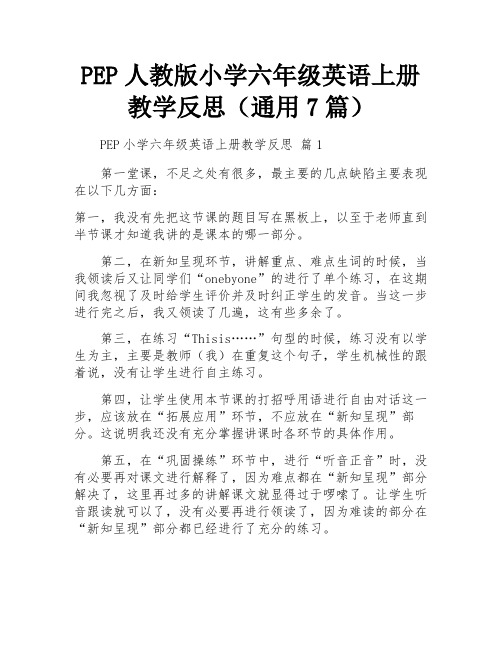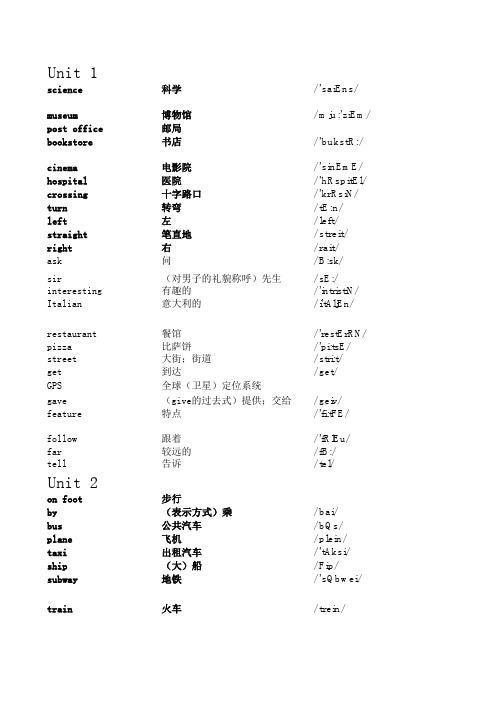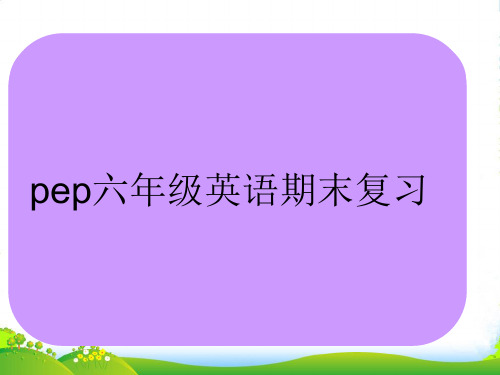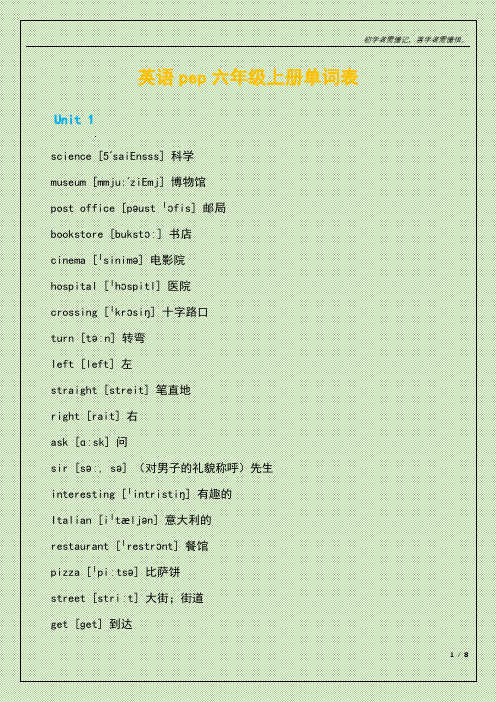PEP六年级上册英语
PEP人教版小学六年级英语上册教学反思(通用7篇)

PEP人教版小学六年级英语上册教学反思(通用7篇)PEP小学六年级英语上册教学反思篇1第一堂课,不足之处有很多,最主要的几点缺陷主要表现在以下几方面:第一,我没有先把这节课的题目写在黑板上,以至于老师直到半节课才知道我讲的是课本的哪一部分。
第二,在新知呈现环节,讲解重点、难点生词的时候,当我领读后又让同学们“onebyone”的进行了单个练习,在这期间我忽视了及时给学生评价并及时纠正学生的发音。
当这一步进行完之后,我又领读了几遍,这有些多余了。
第三,在练习“Thisis……”句型的时候,练习没有以学生为主,主要是教师(我)在重复这个句子,学生机械性的跟着说,没有让学生进行自主练习。
第四,让学生使用本节课的打招呼用语进行自由对话这一步,应该放在“拓展应用”环节,不应放在“新知呈现”部分。
这说明我还没有充分掌握讲课时各环节的具体作用。
第五,在“巩固操练”环节中,进行“听音正音”时,没有必要再对课文进行解释了,因为难点都在“新知呈现”部分解决了,这里再过多的讲解课文就显得过于啰嗦了。
让学生听音跟读就可以了,没有必要再进行领读了,因为难读的部分在“新知呈现”部分都已经进行了充分的练习。
第六,在“拓展应用”和“发展提高”部分,活动安排的不好,没有充分理解这两环节的教学目标,讲的有些混乱,在以后的教课中我会注意改进的。
第七,板书时,重点句型不写在黑板中间,不利于全班练习。
这堂课的成功之处是:一、合理运用简笔画,简单明了地表达情况,有利于激发学生的学习兴趣,帮助学生全面理解内容。
第二,Homework布置的很合理,很实际,能很好的达到巩固练习效果。
第三,讲课时没有紧张,行为大方得体。
总的来说,本课的教学目标已经圆满完成。
PEP小学六年级英语上册教学反思篇2在教学《What are you going to do today?》第一课时,这节课的教学目标是要求学生通过学习掌握八个动词词组并能运用“be going to do”句型对将来的活动进行提问和描述。
PEP小学英语六年级上册单词表

Unit 1science科学/ 'saiEns/museum博物馆/ mju:'ziEm/ post office邮局bookstore书店/ 'bukstR:/cinema电影院/ 'sinEmE/ hospital医院/ 'hRspitEl/ crossing十字路口/ 'krRsiN/ turn转弯/ tE:n/left左/ left/ straight笔直地/ streit/ right右/ rait/ask问/ B:sk/sir(对男子的礼貌称呼)先生/ sE:/ interesting有趣的/ 'intristiN/ Italian意大利的/ i'tAljEn/restaurant餐馆/ 'restErRN/ pizza比萨饼/ 'pi:tsE/ street大街;街道/ stri:t/get到达/ get/GPS全球(卫星)定位系统gave(give的过去式)提供;交给/ geiv/ feature特点/ 'fi:tFE/follow跟着/ 'fRlEu/far较远的/ fB:/tell告诉/ tel/Unit 2on foot步行by(表示方式)乘/ bai/bus公共汽车/ bQs/ plane飞机/ plein/taxi出租汽车/ 'tAksi/ ship(大)船/ Fip/ subway地铁/ 'sQbwei/train火车/ trein/slow慢的/ slEu/down减少;降低/ daun/slow down慢下来stop停下/ stRp/Mrs夫人early早到的/ 'E:li/helmet头盔/ 'helmit/must必须/ mQst/wear戴/ wZE/attention注意/ E'tenFEn/pay attention to注意traffic交通/ 'trAfik/traffic lights交通信号灯Munich慕尼黑(德国城市)/ 'mju:nik/ Germany德国/ 'dVE:mEni/ Alaska阿拉斯加州(美国州名)/ E'lAskE/sled雪撬/ sled/fast快的/ fB:st/ferry轮渡/ 'feri/Papa Westray帕帕韦斯特雷岛Scotland苏格兰/ 'skRtlEnd/ Unit 3visit拜访/ 'vizit/film电影/ film/see a film看电影trip旅行/ trip/take a trip去旅行supermarket超市/ 'sju:pEmB:kit/ evening晚上;傍晚/ 'i:vniN/ tonight在今晚/ tE'nait/ tomorrow明天/ tE'mR:rEu/ next week下周dictionary词典/ 'dikFEnEri/ comic滑稽的/ 'kRmik/comic book(儿童的)连环画册word单词/ wE:d/word book单词书postcard明信片/ 'pEustkB:d/ lesson课/ 'lesn/space太空/ speis/travel(尤其长途)旅行/ 'trAvl/half一半/ hB:f/ price价格/ prais/ Mid-autumn Festival中秋节together一起/ tE'geTE/ get together聚会mooncake月饼poem诗/ 'pEuim/ moon月亮/ mu:n/ Unit 4studies (study的第三代称单数形式)学习puzzle谜/ 'pQzl/ hiking远足/ 'haikiN/pen pal笔友hobby业余爱好/ 'hRbi/ jasmine茉莉/ 'dVAsmin/ idea想法;主意/ ai'diE/ Canberra堪培拉(澳大利亚首都)/ 'kAnbErE/ amazing令人惊奇的/ E'meiziN/ shall表示征求意见/ FAl/goal射门/ gEul/join加入/ dVRin/club俱乐部/ klQb/share分享/ FZE/ Unit 5factory工厂/ 'fAktEri/ worker工人/ 'wE:kE/ postman邮递员/ 'pEustmEn/ businessman商人;企业家/ 'biznismAn/ police officer警察fisherman渔民/ 'fiFEmEn/scientist科学家/ 'saiEntist/ pilot飞行员/ 'pailEt/ coach教练/ kEutF/ country国家/ 'kQntri/ head teacher校长sea大海/ si:/stay保持/ stei/ university大学/ ,ju:ni'vE:siti/ gym体育馆if如果/ if/reporter记者/ ri'pR:tE/ use使用/ ju:s/type打字/ taip/ quickly快速地/ 'kwikli/ secretary秘书/ 'sekrEtEri/ Unit 6angry生气的/ 'ANgri/ afraid害怕/ E'freid/ sad难过的/ sAd/ worried担心的;发愁的/ 'wQrid/ happy高兴的/ 'hApi/ see a doctor看病wear穿/ wZE/ more更多的/ mR:/ deep深的/ di:p/ breath呼吸/ breW/ take a deep breath深深吸一口气count数数/ kaunt/ count to ten数到十chase追赶/ tFeis/ mice(mouse的复数)老鼠/ mais/bad邪恶的;坏的/ bAd/hurt(使)受伤/ hE:t/ill有病;不舒服/ il/wrong有毛病/ rRN/ should应该/ Fud/feel觉得;感到/ fi:l/well健康;身体好/ wel/sit坐/ sit/grass草坪/ grAs/ hear听见/ hiE/ant蚂蚁/ Ant/ worry担心;担忧/ 'wQri/stuck陷住;无法移动/ stQk/ mud泥/ mQd/pull拉;拽/ pul/ everyone每人/ 'evriwQn/sci知→知识,-ence表示抽象名词;’系统的知识”muse-词根:艺术,艺术品,Muse-缪斯女神。
人教PEP新版六年级英语上册听力原文

UNIT 1 How can I get there?Part A Let ’s try (P4)Wu Yifan: These robots are so cool! I love this museum!Robin: Me too! Don ’ t forget to buy some gifts for grandpa.Wu Yifan: I know. But I really need to go to the bathroom. Where is it?Robin: It ’ s on the second floor.Wu Yifan: OK, thanks.Part B Let ’s try (P6)Wu Yifan: Hi, Mike. Let ’s go to the cinema.Mike: Sure. How can I get there?Wu Yifan: Go to Main Street. The cinema is next to the bookstore. See you soon.MIke: OK. Bye.Part C Let ’s check (P10)Boy: Today, I want to go to the museum. From my school I go straight and turn leftat the post office. I can see the bookstore there. From there I go straight ahead.Then, at the cinema I turn right. Finally, I ’ m at the museum. It ’ s not far.UNIT 2 Ways to go to schoolPart A Let ’s try (P14)Amy: Morning, Mike.Mike: Morning. Hey! Don ’t forget! Mrs Smith will take us to the naturepark next Wednesday.Amy: Oh, yes! How do we get to the nature park?Mike: By bus.Amy: look! There ’s Mrs Smith now.Part B Let ’s try (P16)Mrs Smith: Children, let ’s get on the bus!Kids: Yeah!Mrs Smith: You should get on one by one.Children: OK.Chen Jie: Mrs Smith, where is Wu Yifan?Mrs Smith: He ’s not coming. His grandpa is ill.Chen Jie: I ’m sorry to hear that.Part C Let ’s check (P20)1. Wu Yifan: Excuse me. How can I get to the park?Police officer: Take the number 25 bus.Wu Yifan: Can I go on foot?Police officer: No. It ’s too far. Go by bus.2. Boy: My father works near my home. It ’ s great!Girl: My father works in the city.Boy: How does he go to work?Girl: Usually, by train.3.John: Hey, Amy. School is over. How do you go home? Amy:I usually go on foot. And you? By bus?John: No. I go on foot, too.4.Man: Don ’t cross the street now!Woman: Why? There are no cars coming.Man: It ’ s a red light. Cars are very fast! It ’s dangerous. Woman: Ok.UNIT 3 My weekend planPart A Let ’s try (P24)Mike: Hi, Sarah.’s go swimming. Sarah: Good morning, Mike. Today is so warm. LetMike: Sorry, I can ’t. I have to do my homework now.Sarah: OK. What about this afternoon?Mike: No, I can ’t. I ’m going fishing.Part B Let ’s try (P26)John: Amy, where are you going?Amy: I ’ m going to buy some fruits.John: Nice. I ’m going to buy ice cream.Amy: Do you like ice cream?John: No, it ’ s for my cousin Jack.Part C Let ’s check (P30)1. Boy: Hi, John. What are you going to do tomorrow?John: Not much. I ’m just going to do my homework and buy a postcard tomorrow morning. And you?Boy: I ’m going to see a film tomorrow afternoon.John: Great! Can I go too?Q: What is John going to do tomorrow morning?2. Boy: Amy, did you see my new comic book? I ’ m going to read it this evening.Girl: Oh. It looks good. Can I read it after you?Boy: Yes, I can give it to you tomorrow.Girl: OK. Thanks.Q: What is the boy going to do this evening?3.Boy: I ’m going to the bookstore to buy a new dictionary.Girl: Oh. When are you going?Boy: This afternoon. The bookstore is open this evening.Q: Where is the boy going?4.Man: I ’ m going to buy some milk and a newspaper.Woman: Where are you going to buy them?Man: I ’m going to buy them at the small shop near the post office.Woman: Really? I ’ m going to buy a postcard there. Can I go with you?Man: Sure. Let ’ s go together.Q: What is the woman going to buy?Recycle 1P32Yifan: Robin, how do we get to my grandfathers ’ new house from here? Can you use your GPS?Robin: Sure. First, go straight. Then turn left. At thetraffic lights turn left and walk 100 metres. Then,finally, we can see the house.Yifan: Good. What time are we leaving?Robin: 9 o ’ clock.Unit 4 I have a pen palPart A let ’s try (P38)Zhang Peng: Look! I have a new pen pal. He is from New Zealand.Oliver: That ’s good. What ’s his name?Zhang Peng: His name is Peter. He likes playing basketball.Oliver: Oh, is he very tall?Zhang Peng: Yes, he is.Part B let ’s try (P40)Miss White: On the pen pal website, we have a student from Australian.Wu Yifa ,would you like to be his pen pal?Wu Yifan: Sure. Does he study in Primary School, too?Miss White: Yes, he is 11 years old.Wu Yifan: Great! I ’ ll write an email to him today.Miss White: Good! Thank you!Part C Let ’s check (P44)1.Boy: Who ’s that?Girl: That ’s Andy.Boy: Does he like playing basketball?Girl: No, he likes playing football.2.Girl: Does Mike go to school by bike?Boy: Yes, he does.3.Girl1: Does Amy read the newspaper every day?Girl2: No, she doesn ’t, but she loves to read stories.4.Boy: Does your mother like watching TV at night, John?John: No, she likes watching TV in the morning.Unit 5 What does he do?Part A Let ’s try (P48)Oliver: Sarah, today is Parents ’ Day.Sarah: Yes, my mother is coming ,but my father is too busy.Oliver: I see. What does your father do?Sarah: He ’ s a doctor.Part B Let ’s try (P50)Mike: Hi, Xiao Yu. Who is that tall man?Xiao Yu: My uncle.Mike: He is so big. What does he do?Xiao Yu: He is a police officer.Mike: Cool! How does he go to work? On foot?Xiao Yu: No, he goes by car. He often take me to school on his way to work. Part C Let ’s check (P54)Xiao Yu: Hi, Wei Fang. Let ’ s go home.Wei Fang: Sorry, Xiao Yu. My father will come to get me.Xiao Yu: OK. What does your father do?Wei Fang: My father is a police officer. What about your father?Xiao Yu: My father is a coach. My grandfather is a scientist.Wei Fang: Cool! My uncle is a postman, but he wants to be a scientist.Unit 6 How do you feel?Part A Let ’s try (P58)Sam: Phew! It ’ s so cold in January.Sarah: Yes, but we can stay inside and watch films.Sam: Great! I like cartoons.Sarah: Yes, me too. They make me feel happy.Part B Let ’s try (P60)Dad: Ah-choo! (sneeze)Mum: Bless you! Oh, no! You have a fever. You should see a doctor. Dad: OK. But what about the zoo?Mum: It ’ s OK. I will take the kids.Part C Let ’s check (P64)1.John: Mike, it ’ s snowing outside.Mike: That ’ s great, John!John: Really? The cold weather makes me feel sad.Mike: Why? Look at the snow. It ’s so beautiful.John: Yes. I guess so.Mike: It makes me feel so happy.2.Robin: Are you OK, Yifan?Wu Yifan: No, I feel ill.Wu Yifan: Yes, I do.Robin: Hmm. You should see a doctor.3.Chen Jie: Oliver, what ’s wrong?Oliver: I ’ m so angry.Chen Jie: Oh, you should count to ten. Why are you angry?Oliver: Someone took my sunglasses.Chen Jie: No, they are on your head.Oliver: Oh, yes. Haha!4.Zhang Peng: Ah-choo!Amy: Are you OK, Zhang Peng?Zhang Peng: Yes. I ’ m fine.Sarah: Wear warm clothes. It ’ s cold outside. Zhang Peng: I will, thanks.Recycle 2P66My friend Kevin is a farmer. He has two boys and one girl. Hislittle boyis called Ken. He ’s 11 years old. He likes singing. Ken ’s mother is a worker in a milk factory. She likes reading. Ken’ s brother is a fisherman.He likes fishing. His sister is a police officer. She likes doingkungfu. She’s really cool! Ken’ s aunt teaches football. She likes watching football matches, too. His uncle is a postman. He likes going hiking every week.倾听,岁月吹奏长笛,叮咚流韵,悠悠靡音。
人教版pep六年级上册课后单词

人教版pep六年级上册课后单词《人教版PEP六年级上册英语课本课后单词全整理(含音标、词性、解释、造句、近义词、反义词等)》。
Unit 1.by.- 音标:英 [baɪ] 美 [baɪ]。
- 词性:介词。
- 出处:人教版PEP六年级上册Unit 1。
- 解释:1. 在……旁边;2. 通过(某种方式);3. 不迟于;在……之前。
- 造句:I go to school by bike.(我骑自行车去上学。
)。
- 近义词:near(表示“在……旁边”时);through(表示“通过”时,方式略有不同)。
- 反义词:far from(表示“在……旁边”的反义)。
on foot.- 音标:英 [ɒn fʊt] 美 [ɑːn fʊt]。
- 词性:介词短语。
- 出处:人教版PEP六年级上册Unit 1。
- 解释:步行。
- 造句:She goes to school on foot.(她步行去上学。
)。
- 近义词:walk。
- 反义词:by car / by bike等(表示乘坐交通工具的短语)。
bike.- 音标:英 [baɪk] 美 [baɪk]。
- 词性:名词。
- 出处:人教版PEP六年级上册Unit 1。
- 解释:自行车;脚踏车;摩托车。
- 造句:I have a new bike.(我有一辆新自行车。
)。
- 近义词:bicycle。
- 反义词:无。
bus.- 音标:英 [bʌs] 美 [bʌs]。
- 词性:名词。
- 出处:人教版PEP六年级上册Unit 1。
- 解释:公共汽车;巴士;客车。
- 造句:I take the bus to school.(我乘公共汽车去上学。
)。
- 近义词:coach(长途客车等语境中可替换)。
- 反义词:无。
train.- 音标:英 [treɪn] 美 [treɪn]。
- 词性:名词、动词。
- 出处:人教版PEP六年级上册Unit 1。
- 解释:- 名词:火车;列车。
- 动词:训练;培养。
人教版(PEP)六年级英语上册期末总复习课件

1、What are you going to do?你想做什么?询问他人在未来的 打算。be going to 后面要跟动词的原形。注意be going to be 意思是 “打算成为什么,干什么职业。” 注意一下句子的区别,找出正确回答。 What are you going to do this afternoon? I am going to 加 做事的词组
pep六年级英语期末复习
重点词汇 science museum post office bookstore cinema hospital crossing turn left go straight turn right 重点句型 Where is the museum shop?
It’s near the door.
3 We’re going to draw some pictures in Renmin Park. 我们要到人民公园去画画。 4、 I’m going to see a film. 我打算去看电影。
5、 I’m going to visit my grandparents. 我打算去看望外 祖父母。
How are you going?I am going to 加交通方式的词组
Who are you going with? I am going to 加某人
部分疑问代词的意义与用法:
(1)What 什么。用来问是什么,做什么,叫什么,什么样等 等。如:What is your name? 你的名字叫什么? What is your father? 你爸爸是干什么的? What is your hobby?你的爱好是什么?What is your favourite food?你最喜爱的食物是什么? What’s your math teacher like? 你的数学老师长得什么样子? (2)Where , 在哪里,到哪里。用来问地点。
pep六年级上册单词表

英语pep六年级上册单词表Unit 1science [5´saiEnsss] 科学museum [mmju:´ziEmj] 博物馆post office [pəust ˈɔfis] 邮局bookstore [bukstɔː] 书店cinema [ˈsinimə] 电影院hospital [ˈhɔspitl] 医院crossing [ˈkrɔsiŋ] 十字路口turn [təːn] 转弯left [left] 左straight [streit] 笔直地right [rait] 右ask [ɑːsk] 问sir [səː, sə] (对男子的礼貌称呼)先生interesting [ˈintristiŋ] 有趣的Italian [iˈtæljən] 意大利的restaurant [ˈrestrɔnt] 餐馆pizza [ˈpiːtsə] 比萨饼street [striːt] 大街;街道get [ɡet] 到达GPS [dʒiː piː es] 全球(卫星)定位系统gave [ɡeiv] (give [ɡiv] 的过去式)提供;交给feature [ˈfiːtʃə] 特点follow [ˈfɔləu] 跟着far [fɑː] 较远的tell [tel] 告诉Unit 2on foot [ɔn] [fut] 步行by [bai] (表示方式)乘bus [bʌs] 公共汽车plane [plein] 飞机taxi [ˈtæksi] 出租汽车ship [ʃip] (大)船subway [ˈsʌbwei] 地铁train [trein] 火车slow [sləu] 慢的down [daun] 减少;降低slow down [sləu] [daun] 慢下来stop [stɔp] 停下Mrs [ˈmisiz] 夫人early [ˈəːli] 早到的helmet [ˈhelmit] 头盔must [mʌst] 必须wear [wɛə] 戴attention [əˈtenʃən] 注意pay attention to [pei] 注意pay [pei] v.付款;给予(注意) n.工资traffic [ˈtræfik] 交通traffic lights交通信号灯Munich [ˈmju:nik] 慕尼黑(德国城市)Germany [ˈdʒə:məni] 德国Alaska [əˈlæskə] 阿拉斯加州(美国州名)sled [sled] 雪橇fast [fɑ:st] 快的ferry [ˈferi] 轮渡Papa Westray [,pɑːpəˈwestrei] 帕帕韦斯特雷岛Scotland [ˈskɔtlənd] 苏格兰Unit 3visit [ˈvizit] 拜访film [film] 电影see a film看电影trip [trip] 旅行take a trip 去旅行supermarket [ˈsju:pəmɑ:kit] 超市evening [ˈiːvniŋ] 晚上;傍晚tonight [təˈnait] 在晚上tomorrow [təˈmɔrəu] 明天next week [nekst] [wiːk] 下周dictionary [ˈdikʃənəri] 词典comic [ˈkɔmik] 滑稽的comic book(儿童)连环画册word [wəːd] 单词word book单词书postcard [ˈpəustkɑ:d] 明信片lesson [ˈlesn] 课space [speis] 太空travel [ˈtrævl] (尤指长途)旅行half [hælf] 一半price [prais] 价格Mid-Autumn Festival [mid] [ˈɔːtəm] [ˈfestəvəl] 中秋节mid [mid] 中央的; 中间的autumn [ˈɔːtəm] 秋天festival [ˈfestəvəl] 节日together [təˈɡeðə] 一起get together聚会mooncake [muːnkeik] 月饼poem [ˈpəuim] 诗moon [muːn] 月亮Unit 4studies [ˈstʌdiz] (study [ˈstʌdi] 的第三人称单数形式)学习puzzle [ˈpʌzl] 谜hiking [haikiŋ] 远足pen pal [pen] [pæl] 笔友pal [pæl] 朋友, 同志, 伙伴hobby [ˈhɔbi] 业余爱好jasmine ['dʒæzmin] 茉莉idea [aiˈdiə] 想法;主意Canberra [ˈkænbərə] 堪培拉(澳大利亚首都)amazing [əˈmeiziŋ] 令人惊奇的shall [ʃæl, ʃəl, ʃl] 表示征求意见goal [ɡəul] 射门join [dʒɔin] 加入club [klʌb] 俱乐部share [ʃɛə] 分享Unit 5factory [ˈfæktəri] 工厂worker [ˈwə:kə] 工人postman [ˈpəustmən] 邮递员businessman ['biznismən] 商人;企业家police officer [pəˈli:s] [ˈɔfisə] 警察fisherman [ˈfiʃəmən] 渔民scientist [ˈsaiəntist] 科学家pilot [ˈpailət] 飞行员coach [kəutʃ] 教练couch [kautʃ] 长沙发country [ˈkʌntri] 国家head teacher [hed] [ˈti:tʃə] 校长sea [siː] 大海stay [stei] 保持university [ˌ juːniˈvəːsiti] 大学gym [dʒim] 体育馆if [if] 如果reporter记者use [juːs] 使用type [taip] 打字quickly [ˈkwikli] 迅速地secretary [ˈsekrətri] 秘书Unit 6angry [ˈæŋɡri] 生气afraid [əˈfreid] 害怕sad [sæd] 难过的worried [ˈwʌrid] 担心的;发愁的happy [ˈhæpi] 高兴的see a doctor [ˈdɔktə] 看病wear [wɛə] 穿more [mɔː] 更多的deep [diːp] 深的breath [breθ] 呼吸take a deep breath深深吸一口气count [kaunt] 数数count to ten [kaunt] 数到十chase [tʃeis] 追赶mice [mais] (mouse [maus] 的复数)老鼠bad [bæd] 邪恶的;坏的hurt [həːt] (使)受伤ill [il] 有病;不舒服wrong [rɔŋ] 有毛病should [ʃud, ʃəd, ʃd] 应该feel [fiːl] 觉得;感到well [wel] 健康;身体好sit [sit] 坐grass [grɑ:s] 草坪hear [hiə] 听见ant [ænt] 蚂蚁worry [ˈwʌri] 担心;担忧stuck [stʌk陷住;无法移动mud [mʌd] 泥pull [pul] 拉;拽everyone [ˈevriwʌn] 每人。
人教版PEP英语六年级上册知识点归纳
Unit 1 How can I get there?1. 名词: science 科学 museum 博物馆 bookstore 书店 cinema 电影院 hospital 医院 crossing 十字路口2. 动词: turn 转弯3. 副词: left 左 right 右 straight 笔直地4. 短语: post office 邮局1. 名词: sir 先生 restaurant 餐馆 pizza 比萨饼 street 大街;街道 GPS 全球(卫星)定位系统2. 动词: ask 问 feature 特点 get 到达 gave(give 的过去式) 供给;交给 follow跟着tell 告知3. 形容词: interesting 好玩的 Italian 意大利的 far 较远的1. — Where is the cinema? 电影院在哪儿?— It ’ns e xt to the bookstore. 紧挨着书店。
2. How can we get there?我们怎么到那儿?3. Turn left at the bookstore. Then turn right at the hospital.到书店左转。
然后到医院右转。
留意:要留意介词的固定搭配。
Turn left/right at the … 到……左/右转。
Get off at the … 在……下车。
一、核心词汇二、了解词汇三、核心句型It’s on the left/right.在左/右边。
Walk/Go straight for …minutes.步行/直走……分钟。
It’seast/west/south/north of the …在……东/西/南/北边。
It’sfar from the …距离……远。
四、了解句型1.Is there a …?……有……吗?拓展: there be 句型(1)主要用以表达“某处(某时)有某人(某物)”,其根本句型为“There+be 动词+名词+介词短语+其他.”There is a football under the chair. 椅子下面有一个足球。
六年级上册英语书pep版单词
六年级上册英语书pep版单词Unit 1 How can I get there?1. science [ˈsaɪəns] (n.) 科学。
2. museum [mjuˈziːəm] (n.) 博物馆。
3. post office [pəʊst ˈɔːfɪs] (n.) 邮局。
4. bookstore [ˈbʊkstɔː(r)] (n.) 书店。
5. cinema [ˈsɪnəmə] (n.) 电影院。
6. hospital [ˈhɒspɪtl] (n.) 医院。
7. crossing [ˈkrɒsɪŋ] (n.) 十字路口。
8. turn [tɜːn] (v.) 转弯。
9. left [left] (adv. & n.) 左;左边。
10. straight [streɪt] (adv. & adj.) 笔直地;直的。
11. right [raɪt] (adv. & n.) 右;右边。
Unit 2 Ways to go to school.1. on foot [ɒn fʊt] 步行。
2. by [baɪ] (prep.) (表示方式)乘。
3. bus [bʌs] (n.) 公共汽车。
4. plane [pleɪn] (n.) 飞机。
5. taxi [ˈtæksi] (n.) 出租汽车。
6. ship [ʃɪp] (n.) (大)船。
7. subway [ˈsʌbweɪ] (n.) 地铁。
8. train [treɪn] (n.) 火车。
9. slow [sləʊ] (adj.) 慢的。
10. down [daʊn] (adv.) 减少;降低。
11. slow down [sləʊ daʊn] 慢下来。
12. stop [stɒp] (v.) 停下。
Unit 3 My weekend plan.1. visit [ˈvɪzɪt] (v.) 拜访。
2. film [fɪlm] (n.) 电影。
人教PEP版小学英语六年级上册常见职业名称
职业名称Occupation Names宇航员astronaut 商人businessman 影星movie star 飞行员pilot 士兵soldier 教授professor讲师lecturer 口译员interpreter 技术员technician 总工程师chief engineer 设计师designer 专家expert 记者correspondent 编辑editor 翻译translator 律师lawyer 银行家banker 商人merchant出纳cashier 试验员experimenter 理发师barber 公共汽车售票员bus conductor 缝纫工人tailor 厨师cook 售货员shop assistant 邮递员postmansinger 歌手writer 作家head teacher 校长dancer 舞蹈家worker 工人cleaner 清洁工postman 邮递员driver 司机businessman 商人secretary 秘书university 大学TV reporter电视台记者fisherman 渔民scientist 科学家police officer 警察football player 足球运动员coach 教练PEP小学英语六年级上册重点单词和句型练习一、重点单词Unit 1:by ( ) foot( ) bike( ) bus( ) train( ) how( )go to school() traffic()traffic light()traffic rule()stop()wait() get to()Unit 2library( ) post office( ) hospital( ) cinema( ) turn( ) bookstore( ) where( ) please( )next to( ) right ( ) left( ) straight( )then ( )Unit 3next week( ) this morning( ) this afternoon( )this evening ( ) comic book( ) post card( )newspaper( ) buy( )Unit 4hobby( ) ride a bike--riding a bike( ) dive--diving( )play the violin—playing the violin( ) make kites—making kites( ) collect stamps—collecting stamps( ) live –lives( ) teach--teaches( ) go--goes( ) watch--watches( ) read--reads( ) does doesn’t=does notUnit 5singer( ) writer( ) actor( ) actress( ) artist( ) TV reporter( ) engineer( ) accountant( ) policeman( ) salesperson( ) cleaner( ) where() work()Unit 6rain( ) cloud ( ) sun( ) stream( ) come from( ) seed( ) soil( ) sprout ( ) plant( )should ( ) then( )Unit 1: ▁▁(经,乘) ▁▁(脚) ▁▁(自行车) ▁▁(公共汽车) ▁▁(火车)▁▁(怎样) ▁▁▁▁(上学)▁▁▁▁(交通)▁▁▁▁▁▁(交通灯)▁▁▁▁▁▁(交通规则)▁▁(停,停车站)▁▁(等待)▁▁▁▁(到达)Unit 2 ▁▁▁▁(图书馆) ▁▁▁▁(邮局) ▁▁▁▁(医院) ▁▁▁▁(电影院)▁▁(转弯) ▁▁▁▁(书店) ▁▁▁(在哪里,到哪里) ▁▁▁(请)▁▁▁(与…相邻) ▁▁▁ (右边) ▁▁(左边) ▁▁▁(成直线地) ▁▁▁(然后)Unit 3 ▁▁▁▁▁(下周) ▁▁▁▁▁(今天上午) ▁▁▁▁▁(今天下午)▁▁▁▁ (今天晚上) ▁▁▁▁(漫画书) ▁▁▁▁(明信片) ▁▁▁▁ (报纸) ▁▁▁(购买)Unit 4▁▁▁(爱好) ▁▁▁▁▁--▁▁▁▁▁▁(骑自行车) ▁▁▁--▁▁▁(跳水) ▁▁▁▁▁▁—▁▁▁▁▁▁▁(拉小提琴) ▁▁▁▁▁—▁▁▁▁▁▁▁(制作风筝) ▁▁▁▁▁▁—▁▁▁▁▁▁(集邮) ▁▁▁–▁▁▁(居住)▁▁▁▁--▁▁▁▁(教) ▁▁--▁▁▁(去) ▁▁▁--▁▁▁(看)▁▁--▁▁▁(读,看) does doesn’t=▁▁▁▁Unit 5▁▁▁▁(歌唱家,歌手) ▁▁▁▁(作家) ▁▁▁▁(男演员) ▁▁▁▁(女演员) ▁▁▁▁(画家) ▁▁▁▁(电视台记者) ▁▁▁▁(工程师) ▁▁▁(会计) ▁▁▁▁(男警察) ▁▁▁▁▁▁(销售员) ▁▁▁(工作)▁▁▁▁(清洁工) ▁▁▁▁(在哪里,到哪里)Unit 6▁▁▁(雨) ▁▁▁ (云) ▁▁▁(太阳) ▁▁▁▁(河,溪) ▁▁▁▁(来自,从…来) ▁▁▁(种子) ▁▁▁(土壤) ▁▁▁ (苗,芽) ▁▁▁(植物,种植) ▁▁▁(应该) ▁▁▁▁(然后)二、单词分类1)交通方式:by bus, by train, by subway, by ship, by plane, by car, on foot2)文具书籍:dictionary, newspaper, comic book, post card3)职业:singer, writer, TV reporter, actor, actress, engineer, accountant, salesperson, policeman, policewoman,artist, cleaner4)V-ing形式:riding a bike, collecting stamps, diving, making kites, playing the violin 5)第三人称单数形式:lives,teaches, watches, goes, does, doesn’t6)公共场所:library,post office, cinema, hospital, science museum, bookstore7)方位:east, west, south, north, turn left, turn right, go straight8)交通灯; red light, yellow light, green light9)自然:sun, cloud, rain, vapour, stream六年级上册四会句子1.你是怎样去上学的?▁▁▁▁▁▁▁▁2.通常我走路去上学。
六年级英语上册pep版单词表
六年级英语上册pep版单词表Unit 1 How can I get there?1. science [ˈsaɪəns] (n.) 科学。
2. museum [mjuˈziːəm] (n.) 博物馆。
3. post office [pəʊst ˈɒfɪs] (n.) 邮局。
4. bookstore [ˈbʊkstɔː(r)] (n.) 书店。
5. cinema [ˈsɪnəmə] (n.) 电影院。
6. hospital [ˈhɒspɪtl] (n.) 医院。
7. crossing [ˈkrɒsɪŋ] (n.) 十字路口。
8. turn [tɜːn] (v.) 转弯。
9. left [left] (adv.) 左。
10. straight [streɪt] (adv.) 笔直地。
11. right [raɪt] (adv.) 右。
12. ask [ɑːsk] (v.) 问。
13. sir [sɜː(r)] (n.) (对男子的礼貌称呼)先生。
14. interesting [ˈɪntrəstɪŋ] (adj.) 有趣。
15. Italian [ɪˈtæliən] (adj.) 意大利的。
16. restaurant [ˈrestrɒnt] (n.) 餐馆。
17. pizza [ˈpiːtsə] (n.) 比萨饼。
18. street [striːt] (n.) 大街;街道。
19. get [ɡet] (v.) 到达。
20. GPS [ˌdʒiː piːˈes] (n.) 全球(卫星)定位系统。
Unit 2 Ways to go to school.1. on foot [ɒn fʊt] 步行。
2. by [baɪ] (prep.) (表示方式)乘。
3. bus [bʌs] (n.) 公共汽车。
4. plane [pleɪn] (n.) 飞机。
5. taxi [ˈtæksi] (n.) 出租汽车。
